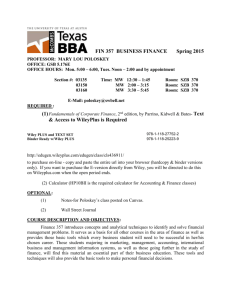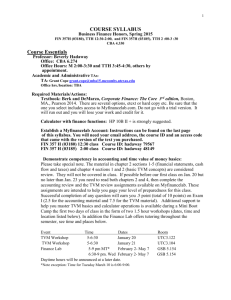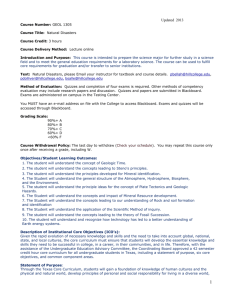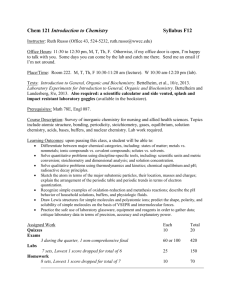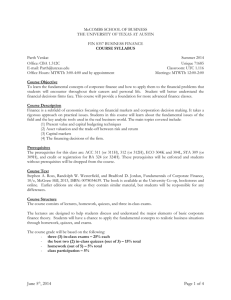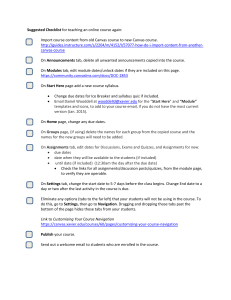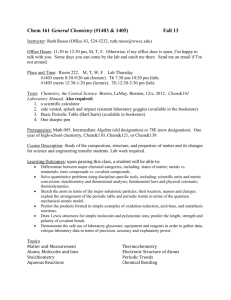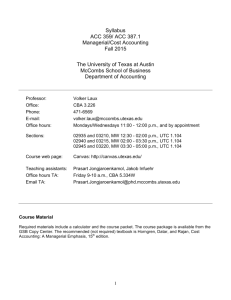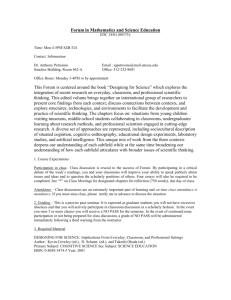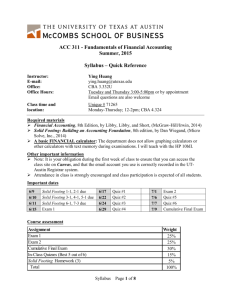ACC 364 - Fundamentals of Taxation - Brown
advertisement
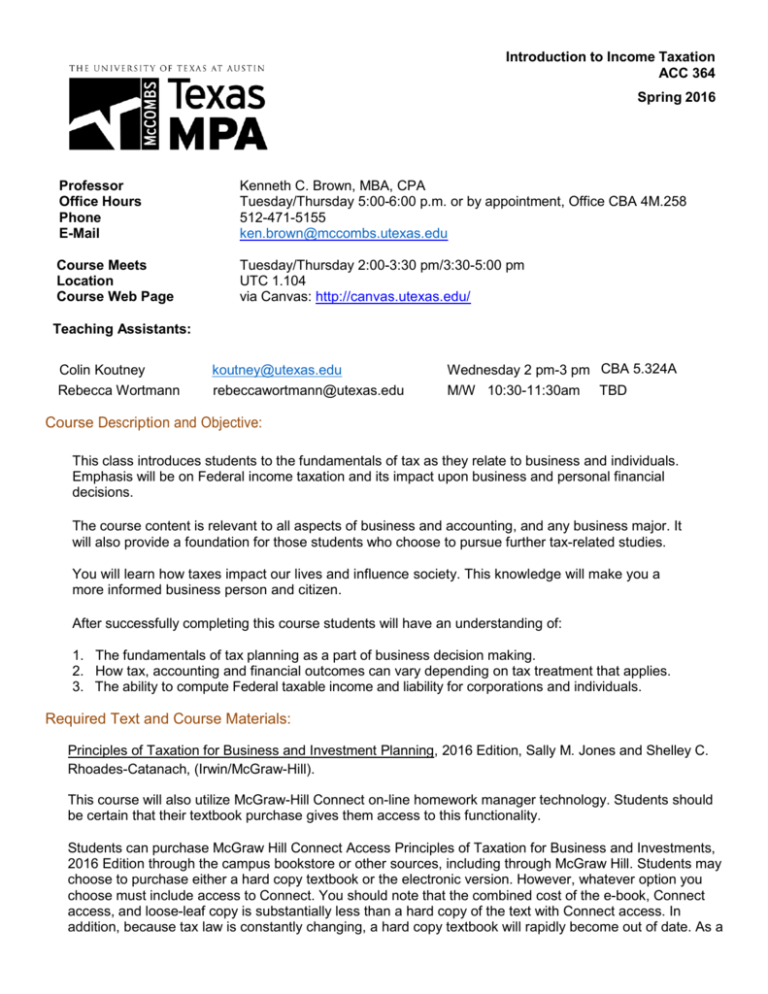
Introduction to Income Taxation ACC 364 Spring 2016 Professor Office Hours Phone E-Mail Kenneth C. Brown, MBA, CPA Tuesday/Thursday 5:00-6:00 p.m. or by appointment, Office CBA 4M.258 512-471-5155 ken.brown@mccombs.utexas.edu Course Meets Location Course Web Page Tuesday/Thursday 2:00-3:30 pm/3:30-5:00 pm UTC 1.104 via Canvas: http://canvas.utexas.edu/ Teaching Assistants: Colin Koutney koutney@utexas.edu Wednesday 2 pm-3 pm CBA 5.324A Rebecca Wortmann rebeccawortmann@utexas.edu M/W 10:30-11:30am TBD Course Description and Objective: This class introduces students to the fundamentals of tax as they relate to business and individuals. Emphasis will be on Federal income taxation and its impact upon business and personal financial decisions. The course content is relevant to all aspects of business and accounting, and any business major. It will also provide a foundation for those students who choose to pursue further tax-related studies. You will learn how taxes impact our lives and influence society. This knowledge will make you a more informed business person and citizen. After successfully completing this course students will have an understanding of: 1. The fundamentals of tax planning as a part of business decision making. 2. How tax, accounting and financial outcomes can vary depending on tax treatment that applies. 3. The ability to compute Federal taxable income and liability for corporations and individuals. Required Text and Course Materials: Principles of Taxation for Business and Investment Planning, 2016 Edition, Sally M. Jones and Shelley C. Rhoades-Catanach, (Irwin/McGraw-Hill). This course will also utilize McGraw-Hill Connect on-line homework manager technology. Students should be certain that their textbook purchase gives them access to this functionality. Students can purchase McGraw Hill Connect Access Principles of Taxation for Business and Investments, 2016 Edition through the campus bookstore or other sources, including through McGraw Hill. Students may choose to purchase either a hard copy textbook or the electronic version. However, whatever option you choose must include access to Connect. You should note that the combined cost of the e-book, Connect access, and loose-leaf copy is substantially less than a hard copy of the text with Connect access. In addition, because tax law is constantly changing, a hard copy textbook will rapidly become out of date. As a result, I recommend the purchase of the electronic version (with the loose leaf copy option) versus the hard copy textbook. The ISBN # for the e-book with loose leaf printed copy and Connect Access is 978-1-25990284-0. Should you choose the electronic version in lieu of a hard copy you should also order a loose-leaf copy of the text form ($40 charge). You may choose to purchase the hard copy textbook instead. The ISBN # for the hard copy textbook with Connect Access is 978-1-259-60517-8. You must have access to some form of hard copy of the text, either loose leaf (recommended) or hardbound text. You should bring the textbook or copies of the relevant loose leaf chapters being discussed with you to each class. (I suggest using a three ring binder for the loose leaf copy). CANVAS will be used for course management. Also, outside readings, exercises or study materials will be posted there. The outside readings are part of the curriculum and will be in scope for quizzes and exams. We will also use Canvas for communicating with the class. During the first week of class you should ensure that: You can access the class site in Canvas and have set up your communication preferences; Your McGraw Hill Connect access is functioning properly. You should also have access to the Internal Revenue Code and related regulations. You are NOT required to purchase them, as sufficient access should be available via the internet or other sources. Additional required readings will be posted on Canvas or provided in class. Evaluation Criteria: Course grades will be determined using the following deliverables and weights: Three Non-Cumulative exams o Lowest exam score o Remaining two exam scores (25% each) Graded homework assigned in Connect/quizzes Projects Total 20% 50% 10% 20% 100% Incompletes will be given only in rare circumstances, according to university policy. Plus or minus grading will be used for final grades. I expect to award a few B-‘s and C’s, many B’s and B+’s and some A-/A’s with an overall course GPA around 3.3. Grade Appeals: If you believe a grading error has occurred, you must appeal within 5 calendar days after the item has been returned to the class or the grade posted on Canvas. Appeals must include a written explanation of the issue attached to the item in question, and be delivered to me in class or at office hours. After 5 calendar days, no appeals will be considered. Homework Homework problems which support the reading have been assigned for most chapters. You will complete these assignments in the Connect website, which will grade your submissions. The purpose of the homework is to encourage and reward timely study to assist you in learning the material. With this in mind, I have set Connect to permit 2 attempts for each homework question. Note that graded homework is an individual assignment governed by the University Code of Conduct. It is not a group project. Because the homework is an invaluable part of your exam preparation, it is in your personal best interest to do the homework yourself. Simply stated, the better you understand the homework, the better you will do better on exams. The Course Schedule attached to this syllabus lists the assigned homework problems. The problems to be graded are noted in BOLD and underlined. They are also listed within the Connect website. Assigned homework will be due by 12 noon on the class day immediately following the relevant lecture. Graded Homework problems should be completed after you have finished the assigned reading and study and attended class. Connect will grade your answers and provide solutions (after both sections of ACC 364 have submitted their homework) giving you feedback for your further study. Homework will be graded as follows: Scores will be awarded based on accuracy of the answers submitted. Connect will accept up to 2 attempts for each question. Homework submitted late, but within 24 hours of the due date will be eligible for a maximum of 50% of the points otherwise available. After 24 hours from the due date, the Connect website will accept no further late homework. There are 22 homework assignments that will be graded. Some homework assignments have more available points than others. Your homework grade will be based on your 18 highest scores. In doing this, I have made allowance for those situations where unforeseen conflicts, commitments, technology or other issues may prevent timely submission of an assignment. No further adjustments to homework scores will be made. The textbook contains additional Application Problems which can help you master the material. To assist you, solutions to the Application Problems not assigned as homework will be provided in Canvas. You are permitted to collaborate with classmates on study problems, but not on those problems that are part of the graded homework. If you have difficulty using Connect or encounter a problem with it, please email your question to Colin Koutney, the TA listed on the first page of this syllabus. If you have questions regarding the exercises or problems, see one of the TA’s during his/her office hours. Projects As noted in the syllabus there will be two projects to be completed outside of class. One will give you the opportunity to prepare a Federal Individual income tax return (Form 1040). All essential information needed to prepare the required forms and schedules will be provided to you. The actual tax forms are available at www.irs.gov . Tax preparation software is NOT permitted. The second project will give you the opportunity to apply a set of facts related to corporate financial information and to prepare a corporate income tax return, Form 1120. It will require you utilize excel in the deliverable. Unlike the graded homework, these outside projects can be discussed with your fellow students. However, each student will be responsible for the timely submission of their own deliverable. Quizzes/Other Assignments Class quizzes and other graded work may be assigned depending on my assessment of class progress. Examples might include (but are not limited to) announced or unannounced in-class quizzes, quizzes conducted in Canvas or additional problem assignments. Scores for such assignments will be included as part of the Homework grade. Exams: 1. Exams will be given on the dates and times specified in the class schedule. (Note that they are in the evening.) Please reserve these dates and times so that you do not have a conflict. If a conflict arises due to another scheduled class or exam, you must notify me at least 2 weeks prior to the scheduled exam date to arrange to take the exam in advance. In an extraordinary event (death in immediate family, illness requiring hospitalization, etc.), contact me before the exam to resolve the matter. 2. All exams will test material covered since the last exam; however, since tax principles build upon one another, certain concepts and principles may appear and be tested on more than one exam. Therefore, although the exams will not technically be “cumulative”, certain material or principles may appear in more than one in exam. 3. The format of the exams will be a combination of problems, short answer, matching and multiple choice. Each exam will test command of material covered since the prior exam. 4. I will inform you in advance of the exam what materials you may bring to use as resources. Always bring a calculator, but laptops, tablets, cell phones or other PDA devices will NOT be allowed in exams. Calculators that can store text are NOT allowed for exams. Class Preparation and Success: Although challenging, the course content can be mastered with reasonable effort and consistent study. Because the concepts build upon themselves, it is essential to keep up with the assigned reading and homework assignments. The path to success includes 1) doing the assigned reading before class, 2) completing the homework on time, and 3) utilizing class lecture to sharpen your understanding of the material. C Classroom sessions will focus on: 1) bringing the highpoints of the reading “to life”, 2) discussing the concepts and working example problems, and 3) group exercises. I welcome questions, and encourage you to think through areas you do not understand as part of your preparation for each class. Classroom Standards and Expectations: Our classroom will apply “business meeting” etiquette: Read the textbook and assigned readings posted in Canvas related to the scheduled topic. Come prepared to discuss the assigned reading and to contribute to the discussion. Bring a version of your textbook (e-book, loose-leaf copy or hard copy) with you to class. Bring and use your nameplate at every class session. Silence your phones. No texting. Laptops/tablets are allowed for note-taking with internet disabled. If laptops or tablets are used for other purposes, you will forfeit use of them for the semester. Bring your financial calculator to class. Calculators that store text are NOT allowed for exams. Please, no extraneous conversation or disruptive behavior. We want one focused discussion. Please be on time. Should you be late, please enter quietly and engage as quickly as you can. If you must leave early, please notify me in advance. You must attend the class section in which you are registered. Drop/Add, Withdrawal, or Incomplete policy: Please refer to the academic calendar for the last day to drop/add a course without financial or academic penalty. It is the student's responsibility to handle withdrawal requirements from any class. You must do the proper paperwork to ensure that you will not receive a final grade of "F" in a course if you choose not to attend the class once you are enrolled. If a student fails to complete this course for illness or other reason deemed adequate, I will use my discretion to assign a grade of I (Incomplete). This will be handled on an individual basis. Religious Holy Days: An absence on religious holidays listed in the University calendar is recognized as an excused absence. Nevertheless, students are fully responsible for all material presented during their absence. If a religious holiday falls on an exam date, please notify me as early as possible. I will handle on an individual basis. Privacy in Canvas: Information in Canvas is protected by your UTEID login. Please be aware that I will use a merged Canvas site for all sections of the course that I am teaching this semester. This will allow students in other sections to see that you are enrolled in the course and send you email from within Canvas. However, they will not actually learn your email address and no other personal data will be revealed through Canvas. If you have any concerns, please contact the ITS Help Desk at 475-9400 for help removing your name from view of other students. Students with Disabilities: Students with disabilities may request appropriate academic accommodations from the Division of Diversity and Community Engagement, Services for Students with Disabilities, 512-471-6259,http://www.utexas.edu/diversity/ddce/ssd/. Academic Integrity: The McCombs School of Business has no tolerance for acts of scholastic dishonesty. The responsibilities of both students and faculty with regard to scholastic dishonesty are described in detail in the Policy Statement on Scholastic Dishonesty for the McCombs School of Business: By teaching this course, I have agreed to observe all of the faculty responsibilities described in that document. By enrolling in this class, you have agreed to observe all of the student responsibilities described in that document. If the application of that Policy Statement to this class and its assignments is unclear in any way, it is your responsibility to ask me for clarification. Policy on Scholastic Dishonesty: Students who violate University rules on scholastic dishonesty are subject to disciplinary penalties, including the possibility of failure in the course and/or dismissal from the University. Since dishonesty harms the individual, all students, and the integrity of the University, policies on scholastic dishonesty will be strictly enforced. You should refer to the Student Judicial Services website at http://deanofstudents.utexas.edu/sjs/ or the General Information Catalog to access the official University policies and procedures on scholastic dishonesty as well as further elaboration on what constitutes scholastic dishonesty. CAVEAT: This syllabus includes policies and plans for the course that may require adjustment as the course progresses. The instructor reserves the right to make changes at any time during the semester with notice to the class.
